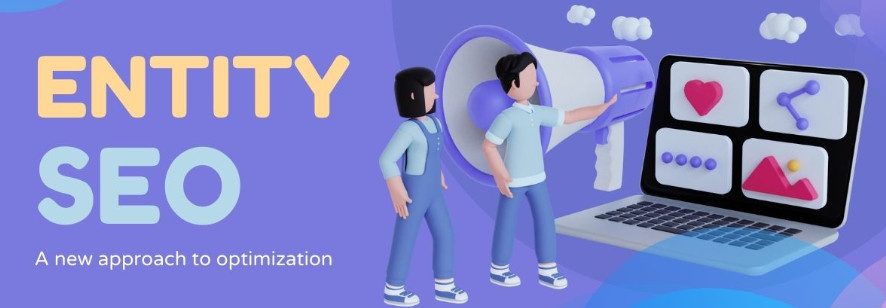Entity SEO
“Entity-based SEO describes a search engine’s attempt to generate the most accurate search engine results by connecting user intent, context, and the relationship between words. When it comes to language, there are certain nuances only humans can understand; machines often process phrases literally.”; Google Results.
Entity SEO is a term that refers to the optimization of web content for entities, not just keywords. Entities are unique, identifiable concepts consistent across various texts or contexts. They can be anything from people, places, things, events, ideas, or categories. For example, “chocolate cake” is an entity, but “delicious chocolate cake recipe” is a keyword phrase that contains the entity.
It (Entity SEO) is essential because search engines like Google use entities to understand the meaning and intent behind a query and to provide relevant and accurate results. Google’s Knowledge Graph is a database of entities and their relationships that powers many features such as the Knowledge Panel, Featured Snippets, and People Also Ask.
But First….
(You might also want to check out Bing about “Bing Entity Search API“
How Google Finds Keywords.
First, we need to understand how Google finds keywords and information about your post and website.
Google finds keywords by using software called web crawlers that explore the web regularly and index the pages they find. Web crawlers scan the content of web pages and identify the words or phrases that are most relevant to the topic or purpose of the page. These words or phrases are then stored in Google’s database as keywords.
They do not read your whole blog, they look for phrases and words relating to search intent.
Google’s Natural Language AI, understands pieces of content by relating them to “entities”.
Keywords are essential for Google because they help it understand what users are looking for and provide them with the best results. Keywords also help advertisers target their ads to the right audience and optimize their campaigns.
If you want to find keywords for your own website or ad campaign, you can use tools like Google’s Keyword Planner, which can help you discover new keyword ideas, get search volume and forecasts, and create keyword plans. You can also use other tools like Google Trends, Google Analytics, or Google Search Console to analyze the performance and popularity of your keywords.
The 3 Main Steps in Providing Search Results.
Google has three main steps to provide search results: crawling, indexing, and serving.
- Crawling: Google uses software called crawlers or spiders to visit web pages and follow links on those pages. Crawlers discover new and updated pages and add them to Google’s list of known pages.
- Indexing: Google analyzes the text, images, and video files on the page, and stores the information in the Google index, which is a large database. Google also extracts keywords and other features from the page, such as the title, headings, meta tags, and links.
- Serving search results: When a user searches on Google, Google returns information that’s relevant to the user’s query. Google uses various algorithms and ranking factors to determine the order and quality of the results. Some of these factors include the keywords, the content, the freshness, the location, the language, and the user behavior.
Google also offers some tools and guidelines for developers and website owners to optimize their sites for search engines. These include Google Search Console, Google Developers, and Google Search Essentials. These resources can help you understand how Google Search works, how to improve your site’s performance, and how to avoid common mistakes.
Optimize for Entities.
To optimize for entities, you need to do the following:
- Identify the entities that are relevant to your content and your audience. You can use tools like Google’s NLP API or Bing’s Entity Search API to extract entities from your text or web pages.
- Use Schema markup to help search engines recognize and index your entities. Schema is a structured data format that can describe various types of entities and their properties and connections.
- Provide rich and informative content that covers the entity and its attributes, such as definitions, descriptions, facts, images, videos, or reviews. You can also link to authoritative sources that provide more information about the entity.
- Monitor your entity performance and visibility using tools like Google Search Console or Bing Webmaster Tools. You can also use analytics tools like Google Analytics or Bing Ads to measure how your entity’s content drives traffic and conversions.
Best Practices for Optimizing for Entity SEO.
Optimize around search intent.
Don’t just write about an entity, write for the people who are looking for it. What are their goals, questions, and pain points? How can you help them achieve, answer, or solve them?
Publish fast, often, and deep.
Search engines favor fresh, relevant, and comprehensive content that covers an entity and its related entities. The more you publish, the more chances you have to rank for different aspects and angles of an entity.
Adopt an entity-first or semantic approach.
Search engines use natural language processing and machine learning to understand the meaning and relationships between entities. Use clear and consistent language, structure your content with headings and lists, and link to authoritative sources that provide more information or evidence about an entity.
Practice keyword research.
But don’t overdo it. Keywords are still important, but they are not enough. Use keywords as a starting point to identify the entities and topics that your audience is interested in.
Then, use tools like Google’s NLP API or Bing’s Entity Search API to find related entities and terms that you can include in your content. Find out about Jaaxy a keyword tool here. Jaaxy Tool.
Optimize your title, URL, and meta description.
These are the elements that appear in the search results and influence whether users click on your page or not. Make sure they are descriptive, relevant, and enticing. Include your main entity and keyword, but also add some modifiers or benefits that make your content stand out.
Use your main entity and keyword in the first paragraph.
This helps search engines and users quickly understand what your content is about and whether it matches their intent. It also signals that your content is focused and relevant to the entity.
Provide rich and informative content.
Make sure that it covers the entity and its attributes. Use different types of content, such as text, images, videos, or reviews, to provide a complete and engaging picture of the entity. You can also use schema markup or structured data to help search engines understand and display your content better.
Final Thoughts
Entity SEO is not a one-time thing. It’s an ongoing process that requires constant monitoring and improvement. Use tools like Google Search Console or Bing Webmaster Tools to track how your entity content performs and how it affects your overall SEO rankings.
You can also use analytics tools like Google Analytics or Bing Ads to measure how your entity’s content drives traffic and conversions.
Entity SEO is the future of SEO. By optimizing your content for entities, you can provide more value to your users and rank higher in the search results. Start today by following these best practices and see the difference for yourself!
Future Proof Your Search Strategy.
Entity SEO can future-proof your search strategy and achieve more targeted and qualified traffic. If you want to learn more about entity SEO, you can check out some of these web search results:
Entity SEO: The definitive guide – Search Engine Land
Entities In SEO: What Are They And Why Do They Matter?
Entities, topics, keywords: Clarifying core semantic SEO concepts
Some links on this site may be affiliate links, and if you purchase something through these links, I will make a commission on them. There will be no extra cost to you and, you could actually save money. Read our full affiliate disclosure here.



I have to admit it, entity SEO is a new term I have not heard before, although I have been in the online business and using content marketing tactics for quite a few years already. I am always willing and wanting to learn something new, especially something that will provide more traffic and possible sales though!
After reading through the helpful article you have put together, I realized our content team may not have used that exact terminology, but they are factoring in and using this approach into the SEO efforts they undertake on a daily basis. It does make sense too, as people generally are looking for more than a particular word or short phrase.
The suggestions that you provide near the end of the article are most helpful. Tracking results is essential to measuring the success or failure of SEO efforts and can help point out specific areas or posts that can be improved on to get better results. This was an excellent and informative post for all business owners, thanks (I am passing it on to our content marketing team too)!
Thank you Dave. Entity SEO is still fairly new and I understand where Google are coming and going with it ( as much as anyone can, lol) In my limited opinion I believe they are reinforcing there policies and just driving it down deeper.
And when you mention people looking for a word or search phrase I wonder if Google are factoring in people like me who might think of something once removed from the subject but still linked. It would certainly make linking easier…for Google.
I am very pleased you like the article and likewise have enjoyed chatting. Please drop in any time.
Steve
Hey thank you for this post!
I was aware briefly of what SEO is however entity seo is something new. Your post is packed with useful information, answering any questions one may have!
I currently need to publish a couple times more and consistently since that is one of my blogs weakness and after reading what you have mentioned it certainly seems like it is impacting my posts ability to rank well
Thanks again and have a great day!
Hi Sariya,
I am pleased you have been able to use my post to look at your online SEO. SEO is important but probably even more important is writing for the reader and not Google. Too often we fall into the trap of writing for Google and not the reader. If we don’t change we will get penalized and Google has a long memory.
Stephen